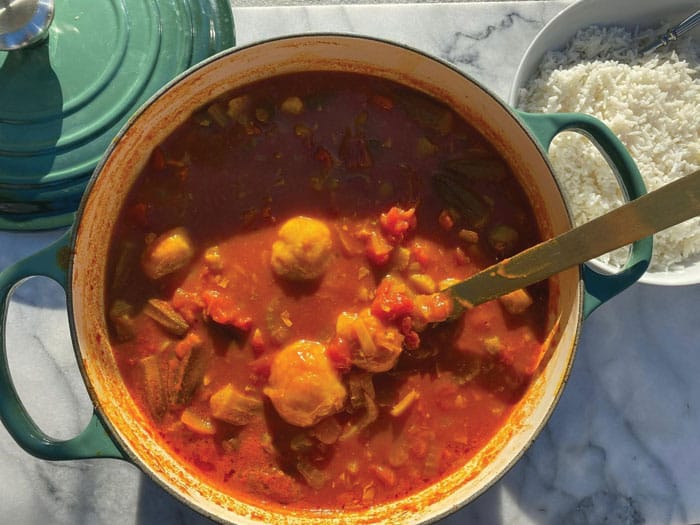 Photo by Sephardic Spice Girls
Photo by Sephardic Spice Girls When Rachel and I started publicizing our latest Kubbah class, I was pleasantly surprised to hear from so many of my Ashkenazi friends that kubbah is one of their favorite foods. I guess I shouldn’t have been surprised—almost anyone who has traveled to Israel has been initiated into the unique deliciousness that is Kubbah. The crown jewel of the Babylonian Jewish kitchen, kubbah are shells made from semolina stuffed with a mixture of ground beef, Italian parsley and onion. These yummy, creamy, slightly chewy, round dumplings are then gently simmered in a sweet and sour beet soup (Kubbah Shwandar) or a tomato based sweet and sour okra and butternut stew (Kubbah Bamia).
I was pleasantly surprised to hear from so many of my Ashkenazi friends that kubbah is one of their favorite foods.
It takes a lot of work to set up a cooking demonstration for fifty people. Rachel and I, along with our good friends Esther Avrahamy and Jazmin Douek, spent one day making 200 kubbah (we froze them — kubbah freezes beautifully). We spent another day with our friends Beth, Jen and Lea making huge pots of the okra and butternut stew and the beet soup.
Whenever we cook at Kahal Joseph Congregation, we are always blessed to have the incredible help of talented chef Penina Meghnagi Solomon and Kahal’s MVP Yvette Dabby.
Rachel and I love being with these two women in the kitchen, learning their authentic Sephardic recipes, their techniques and their shortcuts.
I especially love hearing Yvette speak Judeo-Arabic, the language that my grandmother spoke to me. Spending time at Kahal is like catching a small glimpse of what Jewish life must have been like in Iraq.
The Iraqi Jewish community dated back to the Babylonian exile and was the home of the Babylonian Talmud.
A model of thriving Jewish life, 80% of businesses in Baghdad were Jewish-owned and the markets were closed on the Jewish Sabbath and holidays. Facing violence and persecution, the majority of Jews left Iraq for Israel in Operation Ezra and Nehemia of 1950-51.
However, Yvette and her husband Joseph Dabby grew up with the small remaining group of Jews. In Joe’s bittersweet memoir “No Looking Back,” he describes growing up in a country under an oppressive regime that was hostile to Israel.
From a very young age, Joe learned to be careful of every word that he uttered in public, to be passive and to avoid “trouble” at all times.
When he was 10 years old, Joe discovered that he had three older siblings. When Joe was five, his parents had sent their older children to Israel, planning to join them a few weeks later, but Joe and his parents never made it to Israel.
Joe and Yvette attended Al-Hikma University, which is a branch of Boston College. They both graduated with Bachelor of Science degrees in Civil Engineering.
After the terror of being imprisoned twice by the Iraqi government, Joe knew that his fate was uncertain.
In 1971, Joe and Yvette were married. Soon after, they and a group of friends and acquaintances hired a Kurdish guide to help them escape, never knowing if he would betray them to the authorities. Of their harrowing journey through the mountains to Iran, Joe writes that the deafening silence was interrupted by the occasional howling of wolves in the distance.
From Iran, they went to Holland. Joe’s older brother Charles came from Los Angeles to meet them. In March 1972, they traveled to Israel and after twenty long years, Joe was reunited with his two sisters, Berta and Tikva.
They settled in Los Angeles, where they devoted their lives to raising their three daughters, Jewish education and their Iraqi community at Kahal Joseph, where both have served as President and Yvette is still the Vice President of the Board.
Rachel and I always say that the best part of being a Sephardic Spice Girl is meeting wonderful people and hearing their stories.
Another perk is the privilege of preserving the memories and recipes of our mothers and grandmothers. This recipe for Kubbah Bamia is a real winner. Soothing, nourishing, delicious.
– Sharon
Semolina Kubbah
1/2 cup finely chopped Italian parsley
1 medium onion, grated
2 tsp baharat spice
1 tsp kosher salt
1/2 tsp pepper
For the dough
1 cup farina
1 cup semolina
1/4 lb ground beef
1 cup warm water
1 tsp kosher salt
1/2 tsp pepper
• In a large bowl, combine one pound ground beef, Italian parsley, grated onion, baharat, salt and pepper. Set aside.
• In a second large bowl, combine farina and semolina, the 1/4 pound of ground beef, water, salt and pepper until incorporated. Cool in refrigerator for at least 30 minutes.
• Wet palms with water and roll the dough mixture into walnut-sized balls and place on a tray lined with parchment or wax paper.
• Flatten each dough ball into your palm and place a large teaspoon of filling in the center.
• Gently gather the sides of the dough to cover the filling and delicately pinch closed and roll into a ball.
• Place the stuffed kubbah balls on a tray, loosely cover and leave in the refrigerator for at least 4 hours.
• Gently drop the balls into a pot of boiling soup and cook for about 25 minutes.
• Raw kubbah can be frozen for up to 2 months.
Okra Stew
2 Tbsp avocado oil
2 large onions, finely chopped
6 cloves garlic, minced
4 celery stalks, finely chopped
3 Roma tomatoes, chopped
2 cups butternut squash,
peeled and diced
1 tsp paprika
1 tsp turmeric
3 Tbsp tomato paste
1 cube chicken consommé
4 Tbsp sugar
2 lemons, juiced
1 14 oz can chopped tomatoes
6 cups water
Salt and pepper to taste
2 lb fresh or frozen okra
• In a large pot, warm oil over medium heat, then add onions and sauté until translucent.
• Add garlic, celery, tomatoes, butternut squash, paprika and turmeric, then simmer about 10 minutes, until vegetables soften.
• Add tomato paste, chicken consommé, sugar, lemon juice, chopped tomatoes, water and salt and pepper. Stir well, cover and let simmer for 20 minutes.
• Add okra, cover and simmer for 10 minutes.
• Very gently drop the Kubbah balls into the stew, making sure that the liquid covers the Kubbah completely.
• Reduce heat to low, cover pot and cook for 25-30 minutes.
Rachel Sheff and Sharon Gomperts have been friends since high school. They love cooking and sharing recipes. They have collaborated on Sephardic Educational Center projects and community cooking classes. Follow them on Instagram @sephardicspicegirls and on Facebook at Sephardic Spice SEC Food.























 More news and opinions than at a Shabbat dinner, right in your inbox.
More news and opinions than at a Shabbat dinner, right in your inbox.